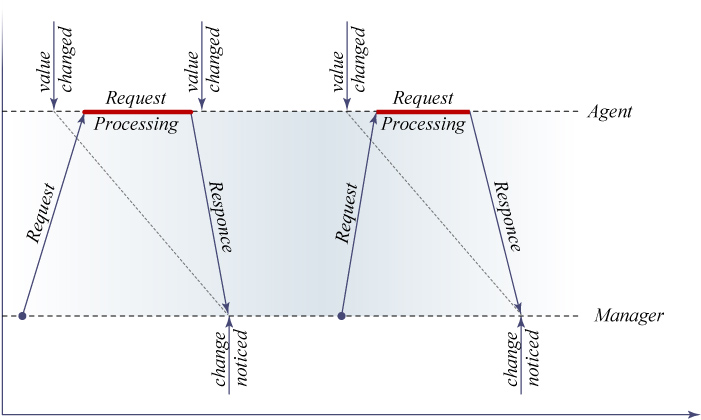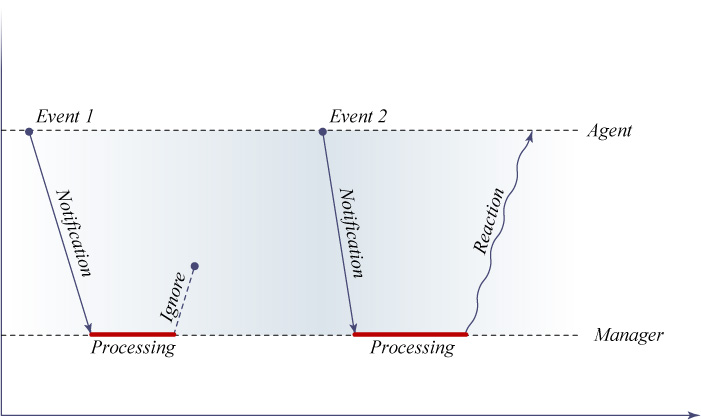Management Interactions
Network management, just like any other type of management, is all about communication and interaction. Manager interact with agents to monitor and control their activities. There are two basic approaches to organization of interactions between them. They correspond to the two possible answers to the question "Who initiates the interaction?": the interaction can be initiated either by manager, or by agent. The former is called polling, and the management is in turn polling-based (passive), while for the latter it is event-based (active). Iotellect Network Manager supports both approaches.
Polling-Based Management
Polling refers here to the manager-agent conversation initiated by manager. The interaction itself is based on a request-response cycle:
Manager decides when to start the conversation: at certain moments of time with the predefined intervals, or on certain events (when a user requests update of management information for example).

Iotellect Network Manager does not initiate polling every time when management information of network elements is requested by operators. Instead, it caches the information and uses cached data upon requests, refreshing it when necessary. Consequently, the management information is requested (and the polling is initiated) under the following circumstances:
- when a management application initially takes management ownership of a device, storing the information in the Iotellect Network Manager's cache for the first time;
- when an information in the cache is considered outdated: e.g., if it is too old (with respect to the device management settings), or when a certain corresponding notification was received, or when a user directly requests a cache update.
There's a delay between the moment an event occurs at the agent side (e.g. some value has changed) and the moment it was observed by the manager. The delay depends on the frequency of polling requests. On the other hand, excessively often requests abuse both network and management system. Iotellect Network Manager provides means to adjust the polling frequency for particular pieces of management information according to the certain user needs.
Request granularity is another polling-based management concern. Iotellect Network Manager supports both bulk requests and incremental operations, and automatically uses an appropriate method in different situations.
Besides, Iotellect Network Manager supports collecting historical information, making it available for processing and analyzing.
Event-Based Management
Event-based communication in many ways can be considered an opposite technique to polling. Contrary to a response that is sent after a request, the agent determines on its own when it needs to send an event message, without waiting to be asked first. The agent initiates communication and sends the manager a message, notifying it about some type of occurrence or event that has occurred. This can be, for example, an alarm that indicates that paper has been jammed on a printer, or a warning about CPU overheating on a device, or someone tried to unsuccessfully log on to a device several times in a row as a possible indication of suspicious activity, and so on. Agent should be properly configured to send event notifications to a specific manager. This can be done either using the management application (called subscription to events), or using external (device-specific) tools.

Manager decides independently, when and how it reacts to the events it receive. It can react immediately with some kind of control action, or do it with a delay, or send some kind of clarification request, or simply ignore the event.
In Iotellect Network Manager event-based management is implemented, for example, as SNMP traps reception, Syslog messages processing, and NetFlow data collection.
Was this page helpful?